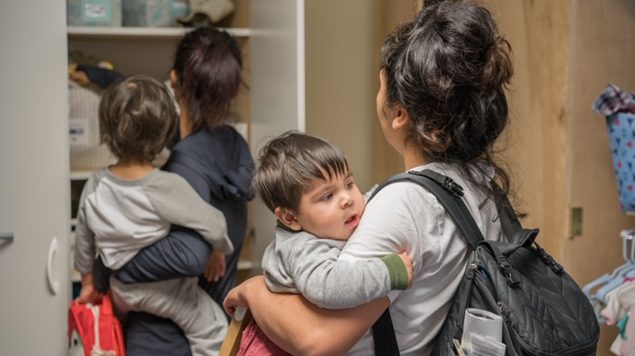Jada Fortunato was single, 19 and working her way through college when she became pregnant.
Statistically, that scenario often ends in abortion. Fortunato expected to sacrifice college to support her child. She didn’t have to make that choice, however, because a family friend told her about Mercy House, a support center for struggling families in the Archdiocese of Newark.
“Everyone was welcoming there,” said Fortunato, now 21, of North Arlington, New Jersey, as 2-year-old Giovanni babbled in the background. “When I was pregnant, I received assistance with food. And once I had the baby, I received a lot of help. I was getting formula, I was getting diapers, wipes, a car seat and one of those bouncy seats. I would definitely have struggled without their assistance.”
She was fortunate that someone in her circle told her where to find help. Because that connection is missing for many women with crisis pregnancies, the U.S. Conference of Catholic Bishops (USCCB) created “Walking with Moms in Need: A Year of Service.”
The initiative calls for parishes to inventory local resources for pregnant women and young families, reach out in friendship to those who are marginalized, identify unmet needs, create solutions, and make sure parishioners know where to direct women and families in need.
“It’s the sort of thing everyone can get behind because it’s something that unites us,” said Kat Talalas, assistant director of pro-life communications at the bishops’ conference. “We love all people, we care for the vulnerable. It brings people together and helps us focus on something really important, regardless of where you fall on the spectrum of personal ideology.”
“Walking with Moms” was slated to launch March 25, the 25th anniversary of St. Pope John Paul II’s pro-life encyclical, “Evangelium Vitae” (“The Gospel of Life”).
The timing, it seems, could not have been worse. That month, much of the country went into lockdown due to the coronavirus. Parish activities shut down.
Some dioceses forged ahead, gathering information remotely. Others modified the initiative and many have suspended it until parishes are ready to move forward.
That’s all fine, because “Walking with Moms” was always intended to adapt to local situations, Talalas said. The secretariat of Pro-Life Activities has continued offering support, such as a COVID-related implementation webinar.
In the Diocese of Grand Rapids, Bishop David Walkowiak had just launched Walking with Moms when COVID struck.
“He sent the letter encouraging the priests to get involved and then everything — well, there was no follow up,” said D.J. Florian, director of the diocesan Office of Pastoral Services.
Next month, the diocese plans to pick up where it left off.
“October is a great time, with Respect Life Month already on the books,” he said.
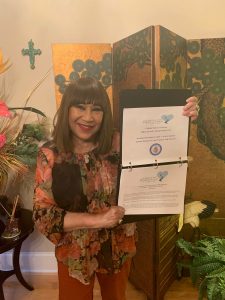
For Charlene Bearden, coordinator of the Office of Family Ministry in the Diocese of Jackson, Mississippi, “Walking with Moms” answered her prayer for a ministry that would protect unborn children while supporting their mothers and families. A former corporate project manager with information technology skills, by February she had mapped a plan out for the diocese, customizable for each parish. Bishop Joseph Kopacz provided strong leadership.
“He is involved every step of the way. It makes a grand difference,” she said.
When COVID struck, Bearden worked from home on “Walking with Moms.” She sought intercession from Servant of God Sister Thea Bowman, a champion of social justice who Bearden had known, and compiled a 76-page resource on available social services.
She is updating it and will soon survey all parishes about their ability to move forward.
“I was never tempted not to continue with this project,” she said. “I just had this passion that it was something that had to be done and it was more necessary now than ever. What is a pregnant woman thinking now, when a lot of pregnancy care places suspended their services? They are really in need and where can they go?”
In the Diocese of Pittsburgh, where Catholic Charities runs “Walking with Moms,” information-gathering also continued during lockdown, with help from a summer intern. Volunteers will continue the work.
“It meets a great need,” said Marion Ahlers, director of marketing and communications.
“It’s not difficult work and the payout — this may sound cliché, but the payout is eternal. It’s 15 minutes on the phone to understand what’s available, what services can be provided. It’s about getting information to people when they need it. And that’s huge.”
In addition to helping women and families, the inventory is helping Catholic Charities to identify unmet needs across the six-county diocese. “There isn’t a complete or consistent breadth of services across our region. We want to understand where the deficits are,” she said.
It is also strengthening the bond between Catholic Charities and parishes as parish leaders learn about the wide array of services the agency provides to anyone in need, she said.
In the Archdiocese of Los Angeles, Gina Vides, the parish engagement strategist for the Office of Life, Justice and Peace, has seen the need for grassroots networking.
A few years ago, Vides discovered that a large parish with a robust pro-life ministry was unaware of a stellar crisis-pregnancy center just down the road. The parish had been so busy with its own activities that it took no notice.
“Networking is so important and ‘Moms in Need’ pushes for it,” she said.
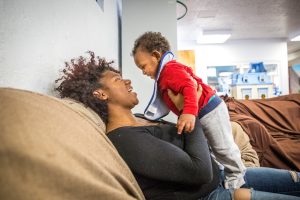
After pursuing networking in Los Angeles for years, she has advice for others.
While the inventory of social services must be far broader than crisis-pregnancy centers, it’s essential to listen to the directors of those centers. Their insights are so valuable that the Office for Life, Justice and Peace meets with them quarterly, Vides said. The pregnancy center directors emphasize that pregnancy itself usually isn’t the main problem.
For instance, the majority of women who have abortions in California already have children. Their biggest concern is how to care for them.
“Some women are afraid to lose their jobs,” she said. “Single women with children have one or two jobs and you’re afraid to tell your boss that you’re pregnant. You need to understand that you have rights in the workplace.”
A woman with a crisis pregnancy “needs more than counseling. She needs wrap-around services for herself, her unborn child, and any other children that she has,” Vides said.
Many programs that help pregnant women don’t carry the “pro-life” label, she said. The St. Vincent de Paul Society, which is active in many parishes, is a prime example.
“If you think of ‘Moms in Need’ and you’re not thinking of St. Vincent de Paul, then let’s promote them,” Vides said. “They regularly assist families with rent, clothes, shoes, beds, cribs. If you need diapers or milk, you call St. Vincent de Paul.”
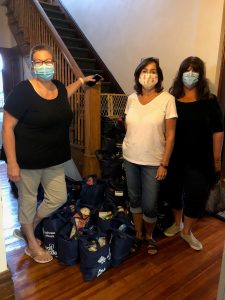
All dioceses in California got a jump on “Walking With Moms” several years ago, with the creation of Options United, a statewide hotline that women with unintended pregnancies can call to get connected to local resources and a caseworker.
Vides’ office has run a major campaign to get that phone number to every parish, with posters, drop cards, bulletin announcements and tables at the twice-yearly regional gatherings of parish leaders.
“Every time we do a regional meeting, it’s like a trade show” for Life, Justice, and Peace, she said.
COVID disrupted similar plans to promote “Walking with Moms.” Elements of the initiative are moving forward under the archdiocesan “OneLife LA” brand for pro-life initiatives.
For now, “Walking with Moms” has been folded into “Hearts to Serve,” a hotline that the archdiocese, the Knights of Columbus, and the St. Vincent de Paul Society created in response to the pandemic. It was first envisioned for homebound seniors, but planners soon saw the vulnerability of pregnant women and young families.
“When hospitals are inundated with people with COVID and you can’t do your regular office visits, what do you do? ‘Hearts to Serve’ helps homebound seniors and pregnant women with immediate, pressing needs: food, formula, diapers. How do I enroll in emergency Medi-Cal because I’m no longer working and my insurance has left?” Vides said.
“So we rolled out what we had prepared for “Moms in Need” and what we’ve been doing all along, providing resources to our parish leaders to help women who are pregnant.”
In the Archdiocese of Newark, where Fortunato received help through Mercy House, Cheryl Riley had just taken a call from a woman who was contemplating an abortion due to economic stress.
“That’s why Mercy House was founded. Finances should never be an excuse for an abortion in the Archdiocese of Newark,” said Riley, director of the archdiocesan Respect Life Office.
“They’re scared,” she said of the women who call. “How will I feed my baby? How will I get diapers? Sometimes they just need a package of wipes. That’s what we do.”
Mercy House will also step in with rental assistance and utilities. It provides bags of food, giving away 50 one day last week alone. If someone can’t get to Mercy House, Mercy House will send help to them. The staff also encourages parents — who typically aren’t married — to engage with a parish and have their babies baptized.
Since Mercy House opened two years ago, Riley has kept up a nonstop stream of publicity.
“Every parish knows that, if there is someone in need, they send them to us.”
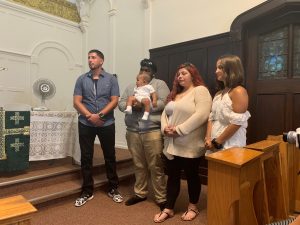
Even as the lockdown lifts, Riley sees greater needs ahead.
“We are going to see a lot of COVID babies,” she said.
Across the archdiocesan border in New York, Sister Virginia Joy, the Respect Life director, is waiting for that spike in pregnancies.
“I don’t think we have seen it yet, which we are a little fearful of. Is it that people are not only fearful of a pregnancy but so fearful of COVID that they aren’t seeking alternative help?” she said.
Her office suspended “Walking With Moms” until parishes are in a better position to focus on it. She considers it vital work.
“It would be really helpful for a parish to be able to say that, within a 10-mile radius, we don’t have a pregnancy center, or we do have one and let’s see what their needs are,” she said. “Most parishes have a pro-life group that has done that at some point, but this is a topic that needs to be kept before people continually.”
While “Walking with Moms” is on pause in many dioceses, “COVID-19 has highlighted the great challenges for moms in need,” said Talalas, at the U.S. bishops’ conference.
“In many cases their situation got worse with the pandemic, at the same time that many agencies had to reduce services. There is an increase in demand for help and a greater need for parishes to coalesce around helping pregnant and parenting moms. We encourage parishes and dioceses and individuals to pick up the mantle for ‘Walking with Moms’ and make it a priority.”
